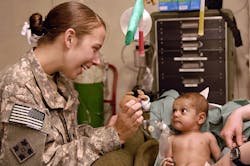WHO releases guidelines about maintaining essential health services
The World Health Organization (WHO) has updated operational planning guidelines about balancing the demands of responding directly to COVID-19, while maintaining the delivery of essential healthcare services, mitigating the risk of system collapse.
The WHO noted that previous outbreaks demonstrated that when health systems are overwhelmed, mortality from vaccine-preventable and other treatable conditions can also increase dramatically. During the 2014-2015 Ebola outbreak, the increased number of deaths caused by measles, malaria, HIV/AIDS and tuberculosis attributable to health system failures exceeded deaths from Ebola.
The guidelines include a set of targeted actions that countries should consider at national, regional and local level to reorganize and maintain access to high-quality essential health services for all.
WHO recommends that countries identify the essential services that will be prioritized and then make strategic shifts to ensure that increasingly limited resources provide maximum benefit for as many people as possible. Countries also need to comply with the highest standards in precautions, especially in hygiene practices, and the provision of adequate supplies including personal protective equipment.
According to WHO, examples of essential services include: routine vaccination; reproductive health services including care during pregnancy and childbirth; care of young infants and older adults; management of mental health conditions, as well as noncommunicable diseases and infectious diseases like HIV, malaria and TB; critical inpatient therapies; management of emergency health conditions; auxiliary services like basic diagnostic imaging, laboratory services and blood bank services, among others.
The guidelines stress the importance of frequent and transparent communications with the public, and strong community engagement, so the public trusts the system to safely meet their essential needs and to control infection risk in health facilities, the WHO said. The guidelines also stress the importance of coordination between governments and health facilities.

